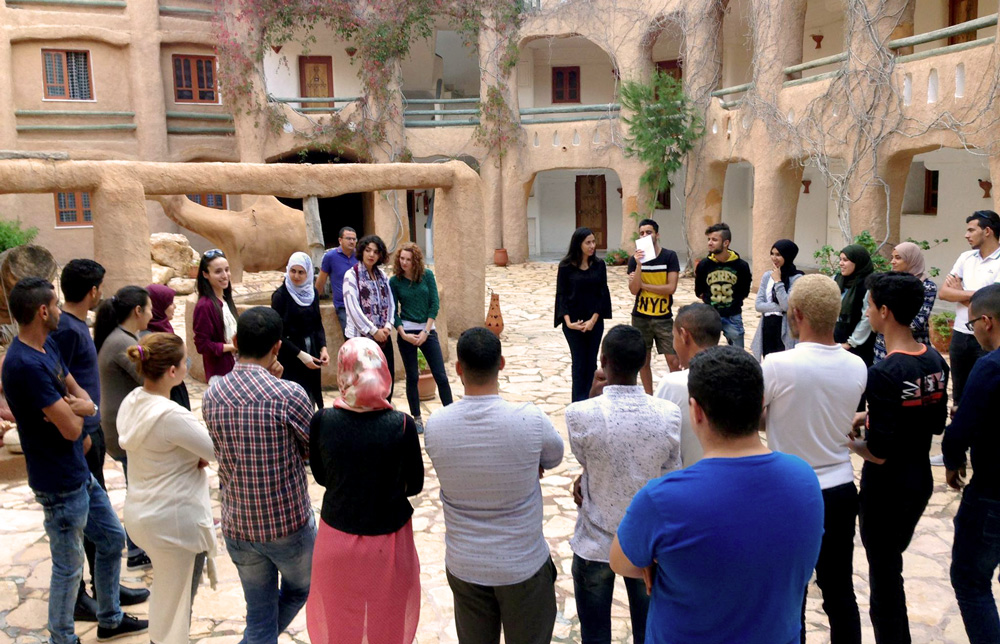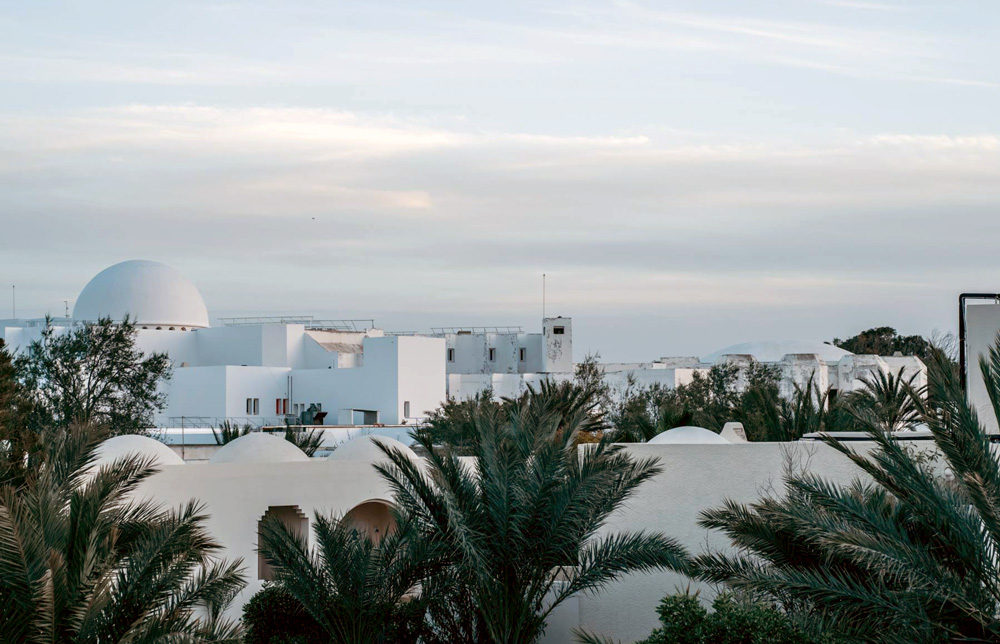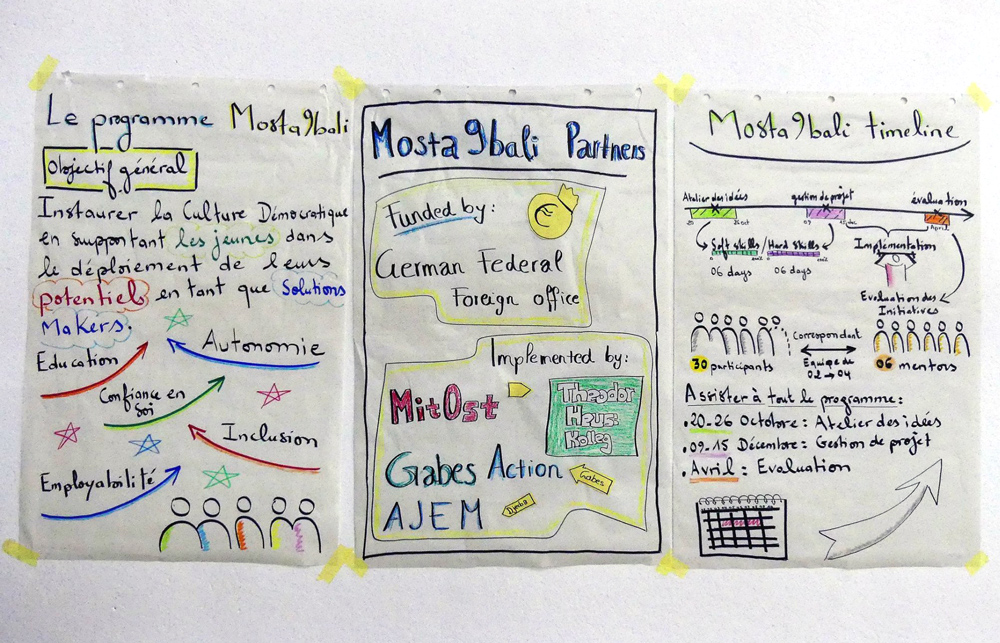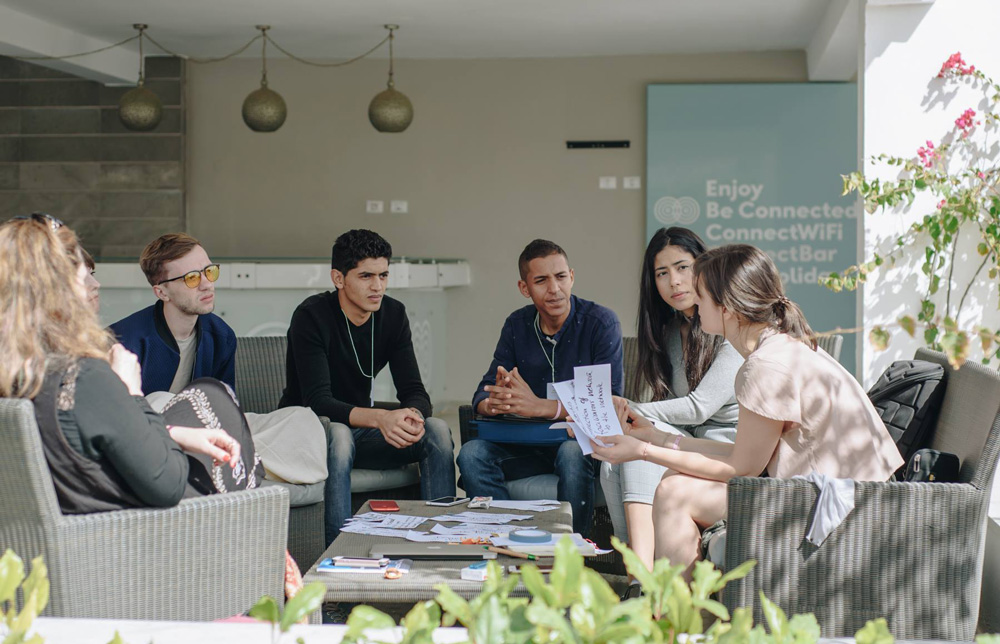Mosta9bali — My Future in Tunisia
How a community development programme in Tunisia is changing young people’s lives.
Mosta9bali literally translated, means “My Future”. Mosta9bali is in Tunisia in the region of Gabes and Djerba. Young people can participate and learn more about project management and themselves. One of the people who decided to join was Hamed Khalili. Looking back, Hamed is now convinced that “Mosta9bali is about changing lives”. After participating in Mosta9bali, Hamed joined our team at the MitOst office in Berlin for three months to look behind the scenes and gain work experience. He shared his story with us.
Back in Tunisia, Hamed had just graduated from university and was looking for a job in the capital, Tunis, when he was asked to join a new programme for Tunisian youth in his hometown. So he had to decide to go on with searching for a job, or to go back home to discover this “new thing”: Mosta9bali.
In the very beginning, the programme didn’t make so much sense to him: he didn’t get the name, or this commercial-sounding description of “project management and capacity building”. Soon enough, he understood it was about community projects in the neighbourhood — which made the programme more attractive. These kind of offers are rare and new in the Gabes region.
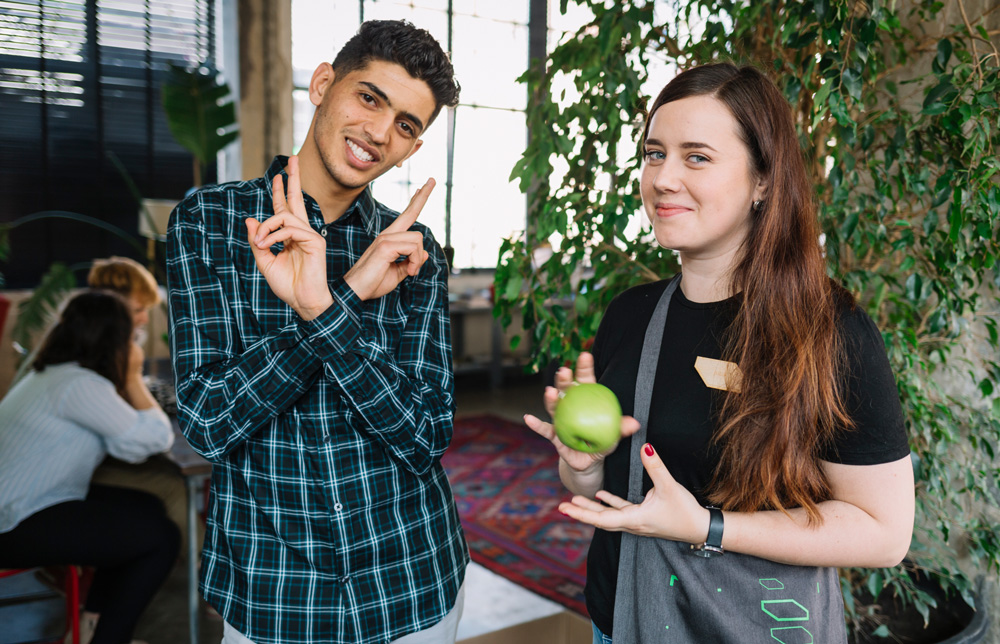
How can I imagine your everyday life in Tunisia before and after Mosta9bali?
Before Mosta9bali I was addicted to Shisha, playing cards and was just trying to find a job. Somehow I was waiting for a miracle. Simply to have a job after graduation to support my family and create my own life. My daily routine was to write and send out some CVs. After this I went out to smoke Shisha. I live with my family, which is a very common thing in Tunisia — you only move out when you marry or you move to another city for work. By that time, I was also somewhat depressed about being dependent on my family. A person my age should be able to do something on his own, no?
After gaining some confidence and more perspectives and ideas, I started my own farming project. My family has an old farm which my grandfather used to run. I bought goats and I planted olive trees. Just yesterday, my goats had their fifth baby — my family was texting me about it the whole day.
Nowadays, if I am not busy with iiDebate and my new job there, with Mosta9bali or visiting trainings or events, I spend my days at the farm. It is not boring at all; every three or four days I meet people from Mosta9bali. We go to events and trainings together, or plan our own projects. I also changed my perspective, and see this year after university as a time to develop myself.
There is so much more we should learn about and train ourselves in. We should get more space to find out what are our specific talents and interests. There should be more places where you can actually practise and try out new things. I have the impression we are limited in the things we learn at school and universities and how we learn.
What are challenges for youth in Tunisia?
A big challenge is unemployment. Many young people are looking for a job. Connected to this topic is also the challenge of equal opportunities. There is a difference if you know a certain group of people, if you are from a wealthy family or if you speak certain languages.
It is also related to the knowledge we gain and skills we learn in our educational system. There is so much more we should learn about and train ourselves in. We should get more space to find out what our specific talents and interests are. There should be more places where you can actually practise and try out new things. I have the impression that we are limited in the things we learn at school and universities and how we learn. This old school way of educating by reading a paper and learning it by heart to pass the test is not the best way.
How can we gain confidence in ourselves? And I also see that the government should gain more confidence in us. How can we actually start entrepreneurial things or businesses if it takes two or three years to get a loan to start it? How to get money to pay for this process if you can’t find a job? And how to get the professional experience they ask for if you are not able to try things out?
What are the challenges in the communities you work with in Tunisia?
Most
of us worked on ideas related to the educational system. We learn in an
environment based on formal education, there is no edutainment or
non-formal-education. There is no space for creativity. For example,
there are no cultural or sport activities to join after school or
university. During my studies at university, there were no additional
offers to learn and practise. I see it now in Germany, there are so many
opportunities to do a lot of courses. In Tunisia, you just sit in a
classroom from morning till evening. The same goes for children in
school. In a small town like my hometown, we have a big school. Pupils
come from smaller villages in the region to visit the school. It often
happens that parents bring their kids at 7 a.m. to school and pick them
up in the afternoon or evening. So they hang around. And there is no
place for them, also to protect them from, let’s say, violence and bad
habits. There is simply no offer to do something constructive in their
free time. This was one issue we all related to and tried to work on.
What were the projects you and your peers came up with?
I
opened a place for children at school in my hometown where they can do
some cultural activities like drawing, reading and theatre. This created
a kind of movement in my school. Another project started to make the
children aware of environmental challenges and how to make Gabes a
better place by keeping it clean. And another project started and opened
a club where you can learn how to turn toys into robots and to code
programmes.
Others of my group initiated a project where they focused on children with learning disabilities. They offered a workshop for parents to raise their awareness as to why their children might not be learning as well as others.
“Schnuni Map” was another interesting project. Schnuni is a touristic place in Gabes and they installed a map for tourists and visitors ate the entrance of the city. It’s even lit in the evenings and at night. And others created a network of university clubs of five universities and offered capacity building for them.
This year, in the second generation, I mentored one project. They took old chairs and tables from school and created trash bins out of it. They installed them near the bus station, because there were no bins there yet to collect all the rubbish. I was very happy to be the mentor and like the creative and sustainable approach. Connected to this, another project team, “Beautiful City”, installed big trash bins at the marketplace and next to school. Their aim was to collect plastic and recycle it. The plastic collected in the container next to the school is sold and the money is used to support the school. This team is now even applying for more projects like this.
In my hometown, we also installed and built the bus station which was destroyed and only the metal frame was left. We covered it again to protect from rain and wind and provide shadow. We added a small free library as well, and timetables. So, in the end, it is much nicer than before. My father and my brother helped me with the repairmen, as this is their profession. People like the station now very much. One of our team members was approached by a company to do this kind of project also in other places.
So, Mosta9bali is already creating a movement in Gabes. More people want to join the programme. Anytime I go to a training or event, I meet two, three, four alumni there. This new kind of jobs which NGOs are creating is a part of the solution for me. Alumni start to work at NGOs, taking over positions or start their own initiatives. Everyone is active and trying out new things. For me, it means my life is less empty than it was before. And I am doing something good for the community and for myself.
I feel the change and in my family, they saw the difference too: they now give me more responsibilities, and they have more confidence in me.
I still remember my first day at Mosta9bali. I met the facilitator and I asked him how to communicate. I knew how to write in English but I could not express myself well in it. The facilitator said I should try and approach Linnéa, the coordinator and initiating team member, to ask for help and translation, as she can also speak French. And I was just too shy to ask her. In general I was shy, too shy to include myself in a group. I was the kind of person who is always stepping back from the group. For me, it was a chance to develop myself and learn. Eventually, I opened up. I feel the change in being open minded, also for other people’s opinions, and I am able and willing to debate things. In my family, they saw the difference too: they now give me more responsibilities, and they have more confidence in me.
I also see this now in the second generation of people joining Mosta9bali. Young people are so afraid of even applying and to say “I want to join”. For example, one girl was asking me many, many times, “Should I apply? How will it be?” and doubting herself because “it will be so difficult for me to speak in front of a group of people”. I motivated her to try it out and to join. At the very beginning, she almost cried when she was asked to introduce herself to the group. But when I look at her now, she is very engaged and working in the programme coordination team and various other initiatives. It was an amazing opportunity for her to step up and to find out about her talents.
I never thought of myself doing something related to administrative or financial work tasks — I usually find them boring. Now that I am doing exactly this kind of work here, it has a meaning for me, because I know the purpose of the overall work. My work here could have an impact on someone’s life in Russia, Ukraine or Tunisia.
Eventually, Hamed started to talk to Linnéa and he slowly improved his English. Later on, he even applied for a job at an airplane company in English and passed the first two interviews. He failed in the third one, but in the end it was a very good experience for him, he says, and he is constantly learning and improving.
I worked for a couple of months’ in Berlin at the MitOst office. I never thought of myself doing something related to administrative or financial work tasks — I usually find them boring. Now that I am doing exactly this kind of work here, it has a meaning for me, because I know the purpose of the overall work. My work here could have an impact on someone’s life in Russia, Ukraine or Tunisia, and her or his life is changing by experiencing one of the Theodor-Heuss-Kollegs’ regional cooperation programmes.
Beeing back in Tunisia Hamed got a job offer, moved to Tunis and started to work for iiDebate, one of the cooperation partners of MitOst in Tunisia. His mission is now to inspire more young people to become active citizens in their communities.
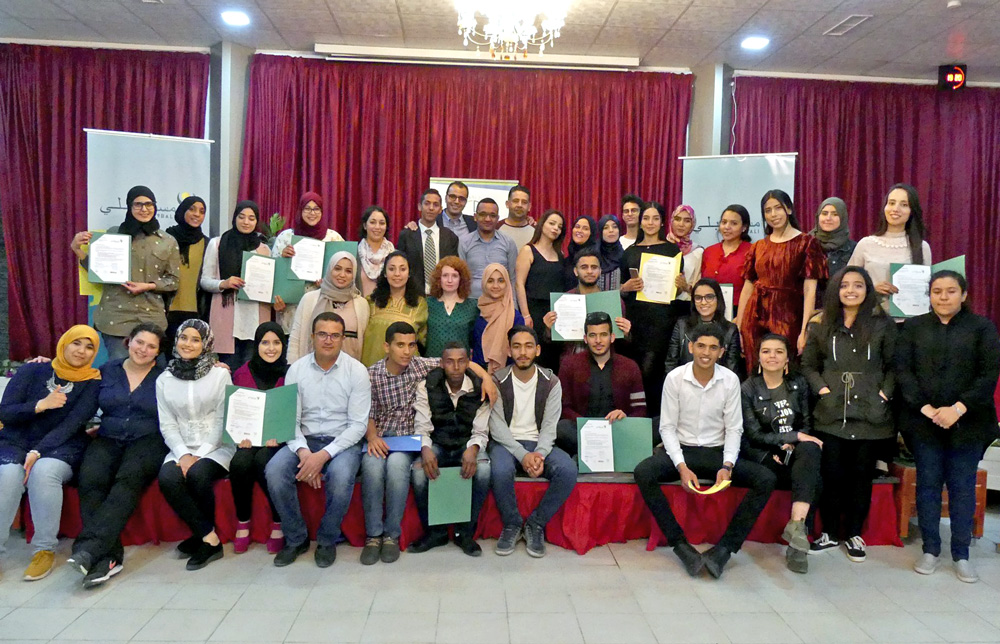
About Mosta9bali
Empower Youth. Explore Diversity. Shape the Future. Mosta9bali equips Tunisia’s youth to drive change and become leaders in their local communities.
Launched in 2017, Mosta9bali, meaning ‘my future’ in Arabic, aims to inspire and empower youth aged from 16 to 20 from Tunisia to become active citizens with the skills to shape their countries future.
Youth make up 70 percent of the Tunisian population, and in the waves of radical transformation that occurred during the “Arabic Spring”, Tunisia’s youth have the critical opportunity to create positive change in their local communities and decide the future of their country. Over the course of three seminars, participants gain the skills to self-reflect and explore their motivations. In the next step, they develop a deeper understanding of topics like civic activism, inclusion, and democratic values. By organising their own social projects, they learn practically what it means to be an active citizen and how they can make a positive direct influence on their local communities. There are two program lines, one in Djerba and one in Gabès, each hosting 30 participants.
Learn more about Mosta9bali here on the THK website and on the program website.
Mosta9bali is implemented in cooperation with AJEM — Association Jlij pour l’Environnement Marin and Gabès Action. The first two programme rounds were supported by the German Federal Foreign Office.
The interview was conducted by Laura Wehrling, PR manager at MitOst e.V.
Photos by Agata Maziarz, Olga Zarko & Mosta9bali.
A version of this article was also published on Medium.com.
